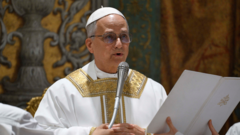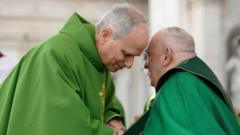In a world increasingly marked by authoritarianism and indifference to vulnerable populations, the death of Pope Francis resonates deeply, leaving a unique challenge for leaders regarding humanitarian advocacy.
Pope Francis' Legacy: A Quiet Departure in Tumultuous Times

Pope Francis' Legacy: A Quiet Departure in Tumultuous Times
The passing of Pope Francis leaves a significant void in compassion and moral leadership globally.
As the world evolves around him, Pope Francis, who dedicated his life to the marginalized, has taken a final bow. His demise marks the end of an era where he stood as the moral compass amidst a changing political landscape. Reflecting a commitment to social justice, the Catholic leader championed the cause of migrants and climate initiatives while critiquing growing authoritarianism. However, with his loss, many are wondering about the trajectory of the global discourse he once helmed.
Francis’ health had been a concern for those close to him, with reports indicating his increasingly frail condition over the past year. Yet, his silent struggle belied an unwavering commitment to advocate for the oppressed and criticize transactional politics. Archbishop Paul Gallagher, the Vatican's foreign minister, highlighted how the pope's silence often echoed his disillusionment with governmental policies. Coupled with mass migrations becoming commonplace and dominant international alliances shifting, the pope’s voice has now been silenced permanently, raising questions about the future of such advocacy.
As heads of state gather for his funeral, the contrast in global leadership is stark. Unlike the early years of his papacy, when alliances with like-minded leaders flourished, today’s political landscape presents fewer allies. Leaders such as President Trump and Argentina's President Javier Milei symbolize a turn towards approaches that diverge from Francis’ humanitarian principles. His absence will be acutely felt and many fear for the absence of a guiding voice in these tumultuous times.
"His voice is certainly missing," stated Archbishop Gallagher, echoing sentiments among those who have drawn strength from Francis' vision. Describing the profound impact of his advocacy, Gallagher remarked that while awareness of his contributions had grown, so, too, had the challenges faced by vulnerable populations globally. Concerns for migrants and refugees, especially in a world experiencing rising xenophobia and economic barriers, seem not to have a successor who could unify discourse and action as effectively.
As the world embarks on a new trajectory of governance amidst increasing uncertainties, the legacy of Pope Francis implores leaders and citizens alike to reflect on the values he champions. His departure signifies not only the loss of a figurehead but also raises crucial questions about accountability, compassion, and solidarity in the face of global trials.
Francis’ health had been a concern for those close to him, with reports indicating his increasingly frail condition over the past year. Yet, his silent struggle belied an unwavering commitment to advocate for the oppressed and criticize transactional politics. Archbishop Paul Gallagher, the Vatican's foreign minister, highlighted how the pope's silence often echoed his disillusionment with governmental policies. Coupled with mass migrations becoming commonplace and dominant international alliances shifting, the pope’s voice has now been silenced permanently, raising questions about the future of such advocacy.
As heads of state gather for his funeral, the contrast in global leadership is stark. Unlike the early years of his papacy, when alliances with like-minded leaders flourished, today’s political landscape presents fewer allies. Leaders such as President Trump and Argentina's President Javier Milei symbolize a turn towards approaches that diverge from Francis’ humanitarian principles. His absence will be acutely felt and many fear for the absence of a guiding voice in these tumultuous times.
"His voice is certainly missing," stated Archbishop Gallagher, echoing sentiments among those who have drawn strength from Francis' vision. Describing the profound impact of his advocacy, Gallagher remarked that while awareness of his contributions had grown, so, too, had the challenges faced by vulnerable populations globally. Concerns for migrants and refugees, especially in a world experiencing rising xenophobia and economic barriers, seem not to have a successor who could unify discourse and action as effectively.
As the world embarks on a new trajectory of governance amidst increasing uncertainties, the legacy of Pope Francis implores leaders and citizens alike to reflect on the values he champions. His departure signifies not only the loss of a figurehead but also raises crucial questions about accountability, compassion, and solidarity in the face of global trials.





















